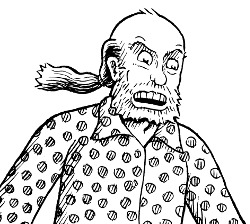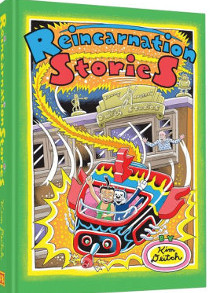Kim Deitch | LJ Author Spotlight
Kim Deitch began his career scripting comics in the pages of the East Village Other in 1967. Often regarded as a "cartoonist’s cartoonist," he won an Eisner Award for Stuff of Dreams in 2003 and an Inkpot Award in 2008.
 |
Kim Deitch began his career scripting comics in the pages of the East Village Other in 1967. Often regarded as a "cartoonist’s cartoonist," he won an Eisner Award for Stuff of Dreams in 2003 and an Inkpot Award in 2008.
Befitting its theme, Reincarnation Stories (see the starred review, LJ 10/19) feels wholly like a new creation yet distinctly rooted in elements of your previous work. Did your ideas about the concept of reincarnation change as you worked on this book?
My attitude about reincarnation did not change while I was working on this book. As a kid, after my parents pooh-poohed my reports of God in heaven that I brought home from the kids on the street, I came up with the idea of reincarnation on my own. This time I kept it to myself. Later in life when I discovered that reincarnation was an established concept, it gave weight to the notion that there might be something to it. Today my attitude is that maybe there’s something to it and maybe there isn’t. Who knows? However, it certainly is good story fodder.
You appear as a character in many of your stories, as does the recurring character Waldo the Cat, who some critics have interpreted as another version of yourself. What’s behind these choices?
This Waldo business. Is he a part of me or some sort of alter ego? God, I hope not. I may not be an angel, but I’d hate to think I was as crummy an individual as that creep. I think he shows some characteristics of my brother Simon, who influenced me to go into comics and whom I often collaborated with in earlier times. Simon is a brasher personality than me and shares other attributes with that little blue piece of cheese, Waldo.
 If you could send a copy of Reincarnation Stories back in time to 1968 so your younger self could critique it, how do you think he’d respond?
If you could send a copy of Reincarnation Stories back in time to 1968 so your younger self could critique it, how do you think he’d respond?
I think my younger self would be blown away, delighted, and completely intimidated.
Many of your stories feature characters obsessed with pop culture. In your mind, is there a connection between the journey of self-discovery a character undertakes while exploring past lives and an investigation of how a character’s life is shaped by the art they love?
There could be something in that. I think that if you were to explore past lives, real or otherwise, that search would undoubtedly tell a person more about themself. All sorts of clues about that person would be right there. Going just a bit further with that, I guess you actually could pick up a lot of clues about me from the past lives I made up in this book. A key way that art has shaped my life is, it’s been the saving of me. Looking myself over, over time, I managed to get rid of many bad habits and, thank God, to replace them with better ones. I would rate myself as kind of a reformed character. You know, that makes me reconsider one of your earlier questions. Maybe there was more of Waldo in me once upon a time.
In the story "Young Avatar," you become wildly successful after creating a line of comics combining biblical characters with elements of superhero and sf stories. Do you concern yourself with thinking about what might attract readers, or what your established fans might want or expect?
I am absolutely concerned about what my established fans are going to think of my work. I am anxious to please. I think the best way for me to do that is to please myself. If I am liking what I am doing, then I consider that to be pretty good sign that I am on the right track.
Several pieces here explore the craft of storytelling, and in the appendix, you discuss the role your subconscious mind plays in generating ideas. As your stories are both wildly entertaining and filled with unexpected turns but also carefully structured, I wonder what role drafting and revision play in your creative process.
Drafting and revising plays a huge part in my creative process; sometimes perhaps, [I worry] to a fault. There was a time when I made stuff up as I went along. Once I did a whole comic book that way. That’s okay when it works. But hit page three on a story that you suddenly realize is going nowhere and you start to reconsider that approach.
This book is dedicated to your wife, Pam Butler, an artist in her own right, who also appears as a character throughout the collection and delivers the last line in the final vignette. Can you tell us more about your next book and whether Pam’s story will play a part?
I’m happy to answer that. Pam plays a big part in my next book, which will be called How I Make Comics . Some of my inspiration to do that book came from a story idea that Pam indeed suggested, which I am using in that book.
The basic format is me pitching one story after another to Pam which she pans one after another for this or that reason. Of course, each one of these ideas will be drawn and presented. Finally, she presents her idea. I like it and that becomes the book’s climactic story. I routinely show Pam everything
I do, and her influence on my work cannot be underestimated. You could say that she has become my very best collaborator. I am envisioning a book about half the size of Reincarnation Stories, but you never know about these things until you get there.
Tom Batten is a writer and teacher whose work has appeared in the Guardian and The New Yorker. He lives in Virginia
This interview was originally published in Library Journal's October 2019 issue
As a member of the board of trustees of the St. Louis County Library District for 17 years and having served as president of the board for 14 of those years I can personally testify to the great work done by Director/CEO Kristen Sorth and her staff. It has been my pleasure to see the St. Louis County Library District grow and meet the varying needs of its patrons. I can
say without a doubt it is the best library district in Missouri and among the best in the nation.
Add Comment :-
RELATED
ALREADY A SUBSCRIBER? LOG IN
We are currently offering this content for free. Sign up now to activate your personal profile, where you can save articles for future viewing









